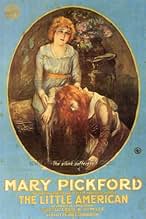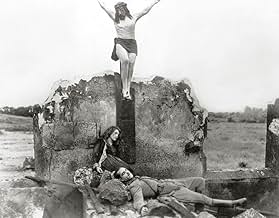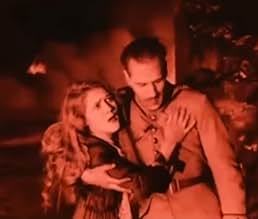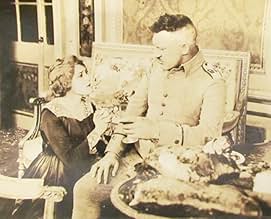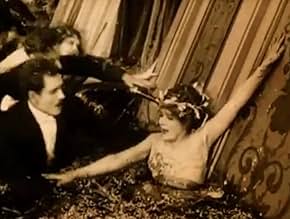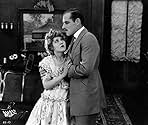NOTE IMDb
6,3/10
769
MA NOTE
Ajouter une intrigue dans votre langueA young American has her ship torpedoed by a German U-boat but makes it back to ancestral home in France, where she witnesses German brutality firsthand.A young American has her ship torpedoed by a German U-boat but makes it back to ancestral home in France, where she witnesses German brutality firsthand.A young American has her ship torpedoed by a German U-boat but makes it back to ancestral home in France, where she witnesses German brutality firsthand.
- Réalisation
- Scénario
- Casting principal
Wallace Beery
- German Soldier
- (non crédité)
Olive Corbett
- Nurse
- (non crédité)
Lucile Dorrington
- Nurse
- (non crédité)
Clarence Geldert
- Submarine Commander U-Boat 21
- (non crédité)
Carl Gerard
- Reverend
- (non crédité)
Robert Gordon
- Wounded Soldier
- (non crédité)
Gordon Griffith
- Child
- (non crédité)
Avis à la une
With the Great War ravaging Europe as this film was made, it's a clear signal of patriotism from star Mary Pickford as she depicts the feisty "Angela". She's from wealthy stock and on her birthday is being courted by French "Count Jules" (Raymond Hatton) and by her slight favourite, the Prussian soldier "Karl" (Jack Holt). Before she has to make any choices, though, both head to their respective homes to fight. Shortly thereafter, she decides to travel to her aunt's home in France only for her liner to be torpedoed and for her to find that when she eventually arrives at her stately pile that the Bosch are intent on billeting there and behaving abominably too. Her American status gives her a degree of protection so long as she stays out of the conflict, and her stiff-necked friend "Karl" is amongst the occupiers, but when their cruelty to the house's staff and to an elderly gent shock her to the core, she decides that she can no longer stay on the fence. What now ensues sees her bravely attempt to help the Allied forces at great peril not just to her, but to her friend who would try to keep her as alive as his upbringing would permit! That merely invites a trial for espionage and treason and a firing squad for both of them looms... Can they find a way to escape the bullets? This is an effective propaganda tool, this film, illustrating just how ghastly the enemy were; how indiscriminate their violence was inflicted and how generally boorish and superior they were. Pickford and Cecil B. DeMille clearly wanted to ram that point home to domestic audiences and on that front they are quite effective. It really could have done with some more light, but even dingy as it is it delivers quite a potent analysis of uniformed thuggery tempered by conflicted romance and a semblance of human decency. It has it's zealous moments - from all sides, and in it's way it is quite a tough film to watch as though not graphic in terms of photography, it is in terms of psychology. It has a clear message to send and is worth a watch, I'd say.
When the US entered World War I, the government forced Hollywood to churn out propaganda films. THE LITTLE American is probably the best of the lot because it stars Mary Pickford.
Pickford plays a young woman torn between two men: Jack Holt (German) and Raymond Hatton (French), but her decision is delayed because of the war as both men enlist.
When the ship Pickford is sailing on is sunk by the Germans (think Lusitania) because it is carrying munitions, Pickford has a great scene as she stands on the lifeboat and yells at the German commander. Later on, of course, she runs into both Holt and Hatton when she is being held as a war prisoner at a château.
Director Cecil B. DeMille provides one truly great scene in this film as Pickford and Holt are wandering through a bombed-out village. They pass a destroyed church of which only one wall remains standing. Against the wall is a very large crucifix. As they stand and watch, the wall collapses but the Jesus figure remains, suspended in mid air. It's a very surreal moment in a film that is otherwise very straightforward and un-artsy.
Pickford is, as always, a pleasure to watch. She was always a very natural actress who avoided the arm-waving histrionics many other actors of the day used. She's also very very pretty. Holt is very good here in a leading-man role. Hatton is OK. Among the list of name actors in "extra" parts are Wallace Beery, Ramon Novarro, Colleen Moore, Ben Alexander, Hobart Bosworth, Norman Kerry, Walter Long, James Neill, and Edythe Chapman.
Not a great film, but interesting to see US propaganda at work.
Pickford plays a young woman torn between two men: Jack Holt (German) and Raymond Hatton (French), but her decision is delayed because of the war as both men enlist.
When the ship Pickford is sailing on is sunk by the Germans (think Lusitania) because it is carrying munitions, Pickford has a great scene as she stands on the lifeboat and yells at the German commander. Later on, of course, she runs into both Holt and Hatton when she is being held as a war prisoner at a château.
Director Cecil B. DeMille provides one truly great scene in this film as Pickford and Holt are wandering through a bombed-out village. They pass a destroyed church of which only one wall remains standing. Against the wall is a very large crucifix. As they stand and watch, the wall collapses but the Jesus figure remains, suspended in mid air. It's a very surreal moment in a film that is otherwise very straightforward and un-artsy.
Pickford is, as always, a pleasure to watch. She was always a very natural actress who avoided the arm-waving histrionics many other actors of the day used. She's also very very pretty. Holt is very good here in a leading-man role. Hatton is OK. Among the list of name actors in "extra" parts are Wallace Beery, Ramon Novarro, Colleen Moore, Ben Alexander, Hobart Bosworth, Norman Kerry, Walter Long, James Neill, and Edythe Chapman.
Not a great film, but interesting to see US propaganda at work.
America entered World War One in April 1917 after almost three years of brutal fighting between England, France and their allies and Germany and its alliance. The first Hollywood so-called propaganda film released soon after Congress declared war on Germany and the Central Powers was Cecil B. DeMille's July 1917 "The Little American," starring Mary Pickford.
Its director DeMille had lost a good friend in the sinking of the Lusitania by a German submarine two years earlier, while Canadian Pickford had seen her native country involved in the war since 1914. Both were ardent supporters of the United States' war effort, and both eagerly participated in a movie that painted the Germans simply as barbarians. The Chicago Board of Censors, in fact, was so concerned about the city's large German-American population that it banned the movie from being shown. Two court rulings eventually overturned the censor board's prohibition from exhibiting "The Little American."
The Jeanne McPherson script does soften the anti-German edges somewhat by creating a young German residing in America as a paramour to Pickford. Karl Von Austreim, played by Jack Holt, is summoned by Germany in the fall of 1914 to join his regiment in Europe. The two lovers depart, only to once again meet on the battlefields of the Western Front. She's seen nursing several injured French soldiers after visiting her aunt in France, who had just died of natural causes near the fighting. Pickford ends up becoming a spy for the French, pinpointing important German artillery on her aunt's property. It is there she meets her old boyfriend, and he ends up becoming a protector for her.
While the film is praised for its recreation of a British liner's sinking by German hands, of which Pickford's character was a passenger, the movie failed to garner the enormous profits for the Mary Pickford Company, through its distribution branch Aircraft Pictures. This is the second and final picture DeMille directed with the popular actress. The first, released a couple months before in "A Romance of the Redwoods," was studio head Adolph Zukor's solution for a career correction for Pickford after viewing the preview of her last film, "The Poor Little Rich Girl." He saw the movie as being a total dud. Despite the actress having a clause in her contract giving her total control over her productions, Zukor felt DeMille's steady, serious hand would straighten her out. Of course "The Poor Little Rich Girl" ended up an enormous hit, and she would revert back to playing a kid again in her next two movies after "The Little American." To be fair, "Redwoods," on the basis of Pickford's star power, became the fourth highest grossing movie of the year.
Meanwhile, the two movies with DeMille spelled doom for her ongoing, unhappy marriage to actor Owen Moore, as well as making it easier in her clandestine romance with Douglas Fairbanks, whom she had met two years earlier at a Tarrytown, N. Y. party. The filming locations of "Redwoods" and "American" took place in southern California, where the married Fairbanks resided. Pickford had been living near her studio in Ft. Lee, N. J. before relocating out West. She would never live in the East ever again.
Returning to "A Little American:" Even a MacPherson script, co-written by DeMille, couldn't quite rescue "A Little American." MacPherson and the director formed one of the more successful and influential working partnerships in Hollywood. As an actress as well as a minor director and scriptwriter, she approached DeMille for an acting job in 1914. Instead, the director, realizing her scenario talents, hired her as a screenwriter. She went on to write 30 of DeMille's first 34 movie scripts, with her last screenplay for the director in 1930's "Madam Satan."
Its director DeMille had lost a good friend in the sinking of the Lusitania by a German submarine two years earlier, while Canadian Pickford had seen her native country involved in the war since 1914. Both were ardent supporters of the United States' war effort, and both eagerly participated in a movie that painted the Germans simply as barbarians. The Chicago Board of Censors, in fact, was so concerned about the city's large German-American population that it banned the movie from being shown. Two court rulings eventually overturned the censor board's prohibition from exhibiting "The Little American."
The Jeanne McPherson script does soften the anti-German edges somewhat by creating a young German residing in America as a paramour to Pickford. Karl Von Austreim, played by Jack Holt, is summoned by Germany in the fall of 1914 to join his regiment in Europe. The two lovers depart, only to once again meet on the battlefields of the Western Front. She's seen nursing several injured French soldiers after visiting her aunt in France, who had just died of natural causes near the fighting. Pickford ends up becoming a spy for the French, pinpointing important German artillery on her aunt's property. It is there she meets her old boyfriend, and he ends up becoming a protector for her.
While the film is praised for its recreation of a British liner's sinking by German hands, of which Pickford's character was a passenger, the movie failed to garner the enormous profits for the Mary Pickford Company, through its distribution branch Aircraft Pictures. This is the second and final picture DeMille directed with the popular actress. The first, released a couple months before in "A Romance of the Redwoods," was studio head Adolph Zukor's solution for a career correction for Pickford after viewing the preview of her last film, "The Poor Little Rich Girl." He saw the movie as being a total dud. Despite the actress having a clause in her contract giving her total control over her productions, Zukor felt DeMille's steady, serious hand would straighten her out. Of course "The Poor Little Rich Girl" ended up an enormous hit, and she would revert back to playing a kid again in her next two movies after "The Little American." To be fair, "Redwoods," on the basis of Pickford's star power, became the fourth highest grossing movie of the year.
Meanwhile, the two movies with DeMille spelled doom for her ongoing, unhappy marriage to actor Owen Moore, as well as making it easier in her clandestine romance with Douglas Fairbanks, whom she had met two years earlier at a Tarrytown, N. Y. party. The filming locations of "Redwoods" and "American" took place in southern California, where the married Fairbanks resided. Pickford had been living near her studio in Ft. Lee, N. J. before relocating out West. She would never live in the East ever again.
Returning to "A Little American:" Even a MacPherson script, co-written by DeMille, couldn't quite rescue "A Little American." MacPherson and the director formed one of the more successful and influential working partnerships in Hollywood. As an actress as well as a minor director and scriptwriter, she approached DeMille for an acting job in 1914. Instead, the director, realizing her scenario talents, hired her as a screenwriter. She went on to write 30 of DeMille's first 34 movie scripts, with her last screenplay for the director in 1930's "Madam Satan."
According to his autobiography The Little American is the film that Cecil B. DeMille wanted to make with Mary Pickford. Both were strong supporters of the Allied cause in World War I. But Adolph Zukor wanted a box office draw with a western so A Romance Of The Redwoods was done first. DeMille envisioned The Little American as part of his contribution to the propaganda war effort. And Pickford was well known for her bond tours with her husband Douglas Fairbanks.
The Little American has Mary Pickford a daughter of the a US Senator and being courted by two men, German-American Jack Holt who receives orders to return to the Fatherland for an officer's commission in the newly declared war and French diplomat Raymond Hatton similarly ordered home. Pickford's family has a château in France and she travels there to be a nurse. But her ocean liner is torpedoed like the Lusitania and she eventually gets there.
But as it turns out the château is in German occupied territory and she's asked to do a little espionage. And who do you think is among the Germans occupying, none other than Holt.
As this was a film that DeMille himself labels a contribution to the war effort a lot of it can be dismissed. Pickford was her heroic best as The Little American. Some aspects of the real life Edith Cavell story are incorporated here with a lot more happy ending.
As for the German atrocities. They'd have to wait until the next war when Hollywood couldn't make up what they did in real life.
The Little American has Mary Pickford a daughter of the a US Senator and being courted by two men, German-American Jack Holt who receives orders to return to the Fatherland for an officer's commission in the newly declared war and French diplomat Raymond Hatton similarly ordered home. Pickford's family has a château in France and she travels there to be a nurse. But her ocean liner is torpedoed like the Lusitania and she eventually gets there.
But as it turns out the château is in German occupied territory and she's asked to do a little espionage. And who do you think is among the Germans occupying, none other than Holt.
As this was a film that DeMille himself labels a contribution to the war effort a lot of it can be dismissed. Pickford was her heroic best as The Little American. Some aspects of the real life Edith Cavell story are incorporated here with a lot more happy ending.
As for the German atrocities. They'd have to wait until the next war when Hollywood couldn't make up what they did in real life.
Little American, The (1917)
** 1/2 (out of 4)
Cecil B. DeMille would eventually become known for his over the top films but I guess you can follow this type of film-making back to 1917 and this picture. The film starts off in America where Angela Moore (Mary Pickford) is being courted by both a German (Jack Holt) and a Frenchman (Raymond Hatton). When WW1 breaks out both men head off to fight for their different countries and soon Mary, now in France, comes under attack by German troops and Holt will have to decide to save her or stand up for his evil country. This film is so over the top in its patriotism that at times it becomes quite laughable. At the start of the film, when Pickford's character is introduced, we learn that she was born on the Fourth of July. When we first see her there's a big American flag waving behind her as she gives that lovely smile towards the camera. Overall this film is a mixed bag full of some great stuff but also containing a lot of weak stuff. The good stuff includes a strong performance by both Pickford and Holt who settle into their roles quite well. Apparently Pickford hated working for DeMille but that doesn't really show as she delivers her strong performance. The battle scenes, for the most part, are pretty good as well. The most interesting aspect of the film is how they show the evils being done by the German's at the time and this includes showing them raping some women as well as killing elderly men. The weak stuff is all the propaganda running throughout the film. I know this was common for the day but this film takes it to a whole new level. Another silly sequence is when Pickford's U-Boat is hit by a German torpedo. The special effects here are so bad that you can tell the boat seems to be a plastic one floating in a tub. The scenes towards the end where Pickford runs into Jesus on the cross doesn't contain the magic that DeMille was going for either. In the end, this is a mixed bag but fans of DeMille and Pickford would probably want to check it out but D.W. Griffith's Hearts of the World is much better.
** 1/2 (out of 4)
Cecil B. DeMille would eventually become known for his over the top films but I guess you can follow this type of film-making back to 1917 and this picture. The film starts off in America where Angela Moore (Mary Pickford) is being courted by both a German (Jack Holt) and a Frenchman (Raymond Hatton). When WW1 breaks out both men head off to fight for their different countries and soon Mary, now in France, comes under attack by German troops and Holt will have to decide to save her or stand up for his evil country. This film is so over the top in its patriotism that at times it becomes quite laughable. At the start of the film, when Pickford's character is introduced, we learn that she was born on the Fourth of July. When we first see her there's a big American flag waving behind her as she gives that lovely smile towards the camera. Overall this film is a mixed bag full of some great stuff but also containing a lot of weak stuff. The good stuff includes a strong performance by both Pickford and Holt who settle into their roles quite well. Apparently Pickford hated working for DeMille but that doesn't really show as she delivers her strong performance. The battle scenes, for the most part, are pretty good as well. The most interesting aspect of the film is how they show the evils being done by the German's at the time and this includes showing them raping some women as well as killing elderly men. The weak stuff is all the propaganda running throughout the film. I know this was common for the day but this film takes it to a whole new level. Another silly sequence is when Pickford's U-Boat is hit by a German torpedo. The special effects here are so bad that you can tell the boat seems to be a plastic one floating in a tub. The scenes towards the end where Pickford runs into Jesus on the cross doesn't contain the magic that DeMille was going for either. In the end, this is a mixed bag but fans of DeMille and Pickford would probably want to check it out but D.W. Griffith's Hearts of the World is much better.
Le saviez-vous
- AnecdotesFilm debut of Ramon Novarro.
- GaffesWhen Angela is returning to her bedroom after taking off the German commander's boots, the shot of her approaching the door is shown twice.
- Citations
Count Jules De Destin: Since you are determined to stay, Mademoiselle, you may render France a great service.
- Versions alternativesThe George Eastman House version in their Motion Picture Study Collection has an uncredited piano score and runs 76 minutes.
- ConnexionsFeatured in The House That Shadows Built (1931)
Meilleurs choix
Connectez-vous pour évaluer et suivre la liste de favoris afin de recevoir des recommandations personnalisées
Détails
- Date de sortie
- Pays d’origine
- Langue
- Aussi connu sous le nom de
- The Little American
- Lieux de tournage
- 2000 De Mille Drive Los Feliz, Californie, États-Unis(Home of Cecil B. De Mille in Laughlin Park, shown in the first shot right after the opening credits)
- Société de production
- Voir plus de crédits d'entreprise sur IMDbPro
Box-office
- Budget
- 166 949 $US (estimé)
- Durée1 heure 20 minutes
- Mixage
- Rapport de forme
- 1.33 : 1
Contribuer à cette page
Suggérer une modification ou ajouter du contenu manquant

Lacune principale
By what name was La petite américaine (1917) officially released in Canada in English?
Répondre
